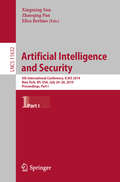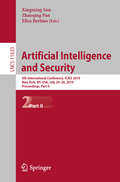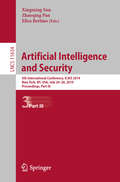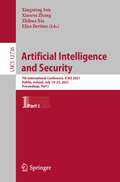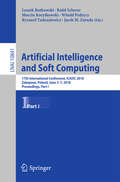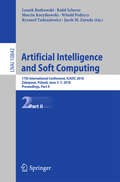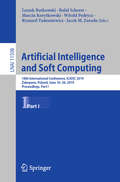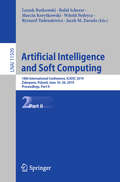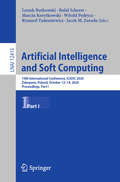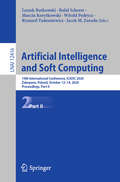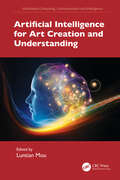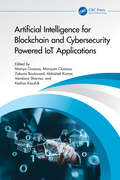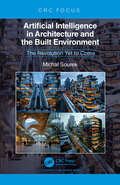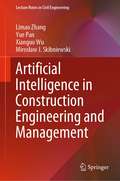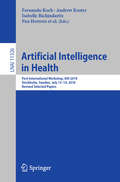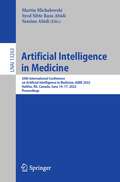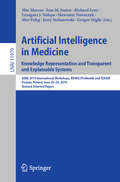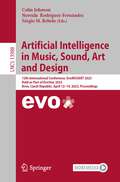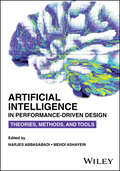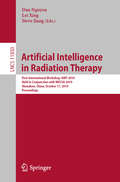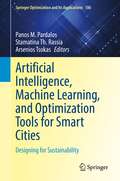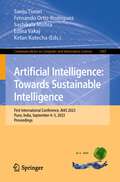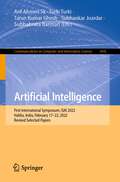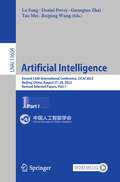- Table View
- List View
Artificial Intelligence and Security: 5th International Conference, ICAIS 2019, New York, NY, USA, July 26-28, 2019, Proceedings, Part I (Lecture Notes in Computer Science #11632)
by Elisa Bertino Xingming Sun Zhaoqing PanThe 4-volume set LNCS 11632 until LNCS 11635 constitutes the refereed proceedings of the 5th International Conference on Artificial Intelligence and Security, ICAIS 2019, which was held in New York, USA, in July 2019. The conference was formerly called “International Conference on Cloud Computing and Security” with the acronym ICCCS.The total of 230 full papers presented in this 4-volume proceedings was carefully reviewed and selected from 1529 submissions. The papers were organized in topical sections as follows: Part I: cloud computing; Part II: artificial intelligence; big data; and cloud computing and security; Part III: cloud computing and security; information hiding; IoT security; multimedia forensics; and encryption and cybersecurity; Part IV: encryption and cybersecurity.
Artificial Intelligence and Security: 5th International Conference, ICAIS 2019, New York, NY, USA, July 26-28, 2019, Proceedings, Part II (Lecture Notes in Computer Science #11633)
by Elisa Bertino Xingming Sun Zhaoqing PanThe 4-volume set LNCS 11632 until LNCS 11635 constitutes the refereed proceedings of the 5th International Conference on Artificial Intelligence and Security, ICAIS 2019, which was held in New York, USA, in July 2019. The conference was formerly called “International Conference on Cloud Computing and Security” with the acronym ICCCS.The total of 230 full papers presented in this 4-volume proceedings was carefully reviewed and selected from 1529 submissions. The papers were organized in topical sections as follows: Part I: cloud computing; Part II: artificial intelligence; big data; and cloud computing and security; Part III: cloud computing and security; information hiding; IoT security; multimedia forensics; and encryption and cybersecurity; Part IV: encryption and cybersecurity.
Artificial Intelligence and Security: 5th International Conference, ICAIS 2019, New York, NY, USA, July 26–28, 2019, Proceedings, Part III (Lecture Notes in Computer Science #11634)
by Elisa Bertino Xingming Sun Zhaoqing PanThe 4-volume set LNCS 11632 until LNCS 11635 constitutes the refereed proceedings of the 5th International Conference on Artificial Intelligence and Security, ICAIS 2019, which was held in New York, USA, in July 2019. The conference was formerly called “International Conference on Cloud Computing and Security” with the acronym ICCCS.The total of 230 full papers presented in this 4-volume proceedings was carefully reviewed and selected from 1529 submissions. The papers were organized in topical sections as follows: Part I: cloud computing; Part II: artificial intelligence; big data; and cloud computing and security; Part III: cloud computing and security; information hiding; IoT security; multimedia forensics; and encryption and cybersecurity; Part IV: encryption and cybersecurity.
Artificial Intelligence and Security: 7th International Conference, ICAIS 2021, Dublin, Ireland, July 19–23, 2021, Proceedings, Part I (Lecture Notes in Computer Science #12736)
by Elisa Bertino Xingming Sun Xiaorui Zhang Zhihua XiaThis two-volume set of LNCS 12736-12737 constitutes the refereed proceedings of the 7th International Conference on Artificial Intelligence and Security, ICAIS 2021, which was held in Dublin, Ireland, in July 2021. The conference was formerly called “International Conference on Cloud Computing and Security” with the acronym ICCCS.The total of 93 full papers and 29 short papers presented in this two-volume proceedings was carefully reviewed and selected from 1013 submissions. Overall, a total of 224 full and 81 short papers were accepted for ICAIS 2021; the other accepted papers are presented in CCIS 1422-1424. The papers were organized in topical sections as follows: Part I: Artificial intelligence; and big data Part II: Big data; cloud computing and security; encryption and cybersecurity; information hiding; IoT security; and multimedia forensics
Artificial Intelligence and Soft Computing: 17th International Conference, ICAISC 2018, Zakopane, Poland, June 3-7, 2018, Proceedings, Part I (Lecture Notes in Computer Science #10841)
by Witold Pedrycz Leszek Rutkowski Marcin Korytkowski Rafał Scherer Ryszard Tadeusiewicz Jacek M. ZuradaThe two-volume set LNAI 10841 and LNAI 10842 constitutes the refereed proceedings of the 17th International Conference on Artificial Intelligence and Soft Computing, ICAISC 2018, held in Zakopane, Poland in June 2018. The 140 revised full papers presented were carefully reviewed and selected from 242 submissions. The papers included in the first volume are organized in the following three parts: neural networks and their applications; evolutionary algorithms and their applications; and pattern classification.
Artificial Intelligence and Soft Computing: 17th International Conference, ICAISC 2018, Zakopane, Poland, June 3-7, 2018, Proceedings, Part II (Lecture Notes in Computer Science #10842)
by Witold Pedrycz Leszek Rutkowski Marcin Korytkowski Rafał Scherer Ryszard Tadeusiewicz Jacek M. ZuradaThe two-volume set LNAI 10841 and LNAI 10842 constitutes the refereed proceedings of the 17th International Conference on Artificial Intelligence and Soft Computing, ICAISC 2018, held in Zakopane, Poland in June 2018. The 140 revised full papers presented were carefully reviewed and selected from 242 submissions. The papers included in the second volume are organized in the following five parts: computer vision, image and speech analysis; bioinformatics, biometrics, and medical applications; data mining; artificial intelligence in modeling, simulation and control; and various problems of artificial intelligence.
Artificial Intelligence and Soft Computing: 18th International Conference, ICAISC 2019, Zakopane, Poland, June 16–20, 2019, Proceedings, Part I (Lecture Notes in Computer Science #11508)
by Witold Pedrycz Leszek Rutkowski Marcin Korytkowski Rafał Scherer Ryszard Tadeusiewicz Jacek M. ZuradaThe two-volume set LNCS 11508 and 11509 constitutes the refereed proceedings of of the 18th International Conference on Artificial Intelligence and Soft Computing, ICAISC 2019, held in Zakopane, Poland, in June 2019. The 122 revised full papers presented were carefully reviewed and selected from 333 submissions. The papers included in the first volume are organized in the following five parts: neural networks and their applications; fuzzy systems and their applications; evolutionary algorithms and their applications; pattern classification; artificial intelligence in modeling and simulation. The papers included in the second volume are organized in the following five parts: computer vision, image and speech analysis; bioinformatics, biometrics, and medical applications; data mining; various problems of artificial intelligence; agent systems, robotics and control.
Artificial Intelligence and Soft Computing: 18th International Conference, ICAISC 2019, Zakopane, Poland, June 16–20, 2019, Proceedings, Part II (Lecture Notes in Computer Science #11509)
by Witold Pedrycz Leszek Rutkowski Marcin Korytkowski Rafał Scherer Ryszard Tadeusiewicz Jacek M. ZuradaThe two-volume set LNCS 11508 and 11509 constitutes the refereed proceedings of of the 18th International Conference on Artificial Intelligence and Soft Computing, ICAISC 2019, held in Zakopane, Poland, in June 2019. The 122 revised full papers presented were carefully reviewed and selected from 333 submissions. The papers included in the first volume are organized in the following five parts: neural networks and their applications; fuzzy systems and their applications; evolutionary algorithms and their applications; pattern classification; artificial intelligence in modeling and simulation. The papers included in the second volume are organized in the following five parts: computer vision, image and speech analysis; bioinformatics, biometrics, and medical applications; data mining; various problems of artificial intelligence; agent systems, robotics and control.
Artificial Intelligence and Soft Computing: 19th International Conference, ICAISC 2020, Zakopane, Poland, October 12-14, 2020, Proceedings, Part I (Lecture Notes in Computer Science #12415)
by Witold Pedrycz Leszek Rutkowski Marcin Korytkowski Rafał Scherer Ryszard Tadeusiewicz Jacek M. ZuradaThe two-volume set LNCS 12415 and 12416 constitutes the refereed proceedings of of the 19th International Conference on Artificial Intelligence and Soft Computing, ICAISC 2020, held in Zakopane, Poland*, in October 2020.The 112 revised full papers presented were carefully reviewed and selected from 265 submissions. The papers included in the first volume are organized in the following six parts: neural networks and their applications; fuzzy systems and their applications; evolutionary algorithms and their applications; pattern classification; bioinformatics, biometrics and medical applications; artificial intelligence in modeling and simulation.The papers included in the second volume are organized in the following four parts: computer vision, image and speech analysis; data mining; various problems of artificial intelligence; agent systems, robotics and control.*The conference was held virtually due to the COVID-19 pandemic.
Artificial Intelligence and Soft Computing: 19th International Conference, ICAISC 2020, Zakopane, Poland, October 12-14, 2020, Proceedings, Part II (Lecture Notes in Computer Science #12416)
by Witold Pedrycz Leszek Rutkowski Marcin Korytkowski Rafał Scherer Ryszard Tadeusiewicz Jacek M. ZuradaThe two-volume set LNCS 12415 and 12416 constitutes the refereed proceedings of of the 19th International Conference on Artificial Intelligence and Soft Computing, ICAISC 2020, held in Zakopane, Poland*, in October 2020.The 112 revised full papers presented were carefully reviewed and selected from 265 submissions. The papers included in the first volume are organized in the following six parts: neural networks and their applications; fuzzy systems and their applications; evolutionary algorithms and their applications; pattern classification; bioinformatics, biometrics and medical applications; artificial intelligence in modeling and simulation.The papers included in the second volume are organized in the following four parts: computer vision, image and speech analysis; data mining; various problems of artificial intelligence; agent systems, robotics and control.*The conference was held virtually due to the COVID-19 pandemic.
Artificial Intelligence for Art Creation and Understanding (Multimedia Computing, Communication and Intelligence)
by Luntian MouAI-Generated Content (AIGC) is a revolutionary engine for digital content generation. In the area of art, AI has achieved remarkable advancements. AI is capable of not only creating paintings or music comparable to human masterpieces, but it also understands and appreciates artwork. For professionals and amateurs, AI is an enabling tool and an opportunity to enjoy a new world of art.This book aims to present the state-of-the-art AI technologies for art creation, understanding, and evaluation. The contents include a survey on cross-modal generation of visual and auditory content, explainable AI and music, AI-enabled robotic theater for Chinese folk art, AI for ancient Chinese music restoration and reproduction, AI for brainwave opera, artistic text style transfer, data-driven automatic choreography, Human-AI collaborative sketching, personalized music recommendation and generation based on emotion and memory (MemoMusic), understanding music and emotion from the brain, music question answering, emotional quality evaluation for generated music, and AI for image aesthetic evaluation.The key features of the book are as follows: AI for Art is a fascinating cross-disciplinary field for the academic community as well as the public. Each chapter is an independent interesting topic, which provides an entry for corresponding readers. It presents SOTA AI technologies for art creation and understanding. The artistry and appreciation of the book is wide-ranging – for example, the combination of AI with traditional Chinese art. This book is dedicated to the international cross-disciplinary AI Art community: professors, students, researchers, and engineers from AI (machine learning, computer vision, multimedia computing, affective computing, robotics, etc.), art (painting, music, dance, fashion, design, etc.), cognitive science, and psychology. General audiences can also benefit from this book.
Artificial Intelligence for Blockchain and Cybersecurity Powered IoT Applications
by Abhishek Kumar Mariya Ouaissa Zakaria Boulouard Mariyam OuaissaThe objective of this book is to showcase recent solutions and discuss the opportunities that AI, blockchain, and even their combinations can present to solve the issue of Internet of Things (IoT) security. It delves into cuttingedge technologies and methodologies, illustrating how these innovations can fortify IoT ecosystems against security threats. The discussion includes a comprehensive analysis of AI techniques such as machine learning and deep learning, which can detect and respond to security breaches in real time. The role of blockchain in ensuring data integrity, transparency, and tamper- proof transactions is also thoroughly examined. Furthermore, this book will present solutions that will help analyze complex patterns in user data and ultimately improve productivity.
Artificial Intelligence in Architecture and the Built Environment: The Revolution Yet to Come
by Michal SourekImagine if every architect had an apprentice who could consistently observe and understand their intentions, take over routine tasks and monitor technical, environmental, and economic constraints. This apprentice would continually improve, freeing the architect to concentrate on truly creative work.This book outlines a plan to turn this vision into reality. It evaluates the development of artificial intelligence from its inception to the present, focusing on the last two decades of applying AI in architectural design and planning; the current state of architectural practice is also examined. Integrating architecture, computer science, AI, robotics, economics, law, neurobiology, and philosophy, the vision is built on three key premises: (i) authentic, poetic creativity that transcends parameterization and algorithmizing, (ii) innovative learning strategies and training approaches not yet applied concerning architectural design, and (iii) the convergence of architecture’s inherent spatiality with virtual reality technology and new theories of human thinking and intelligence, poised for implementation in machine learning.
Artificial Intelligence in Construction Engineering and Management (Lecture Notes in Civil Engineering #163)
by Limao Zhang Yue Pan Xianguo Wu Mirosław J. SkibniewskiThis book highlights the latest technologies and applications of Artificial Intelligence (AI) in the domain of construction engineering and management. The construction industry worldwide has been a late bloomer to adopting digital technology, where construction projects are predominantly managed with a heavy reliance on the knowledge and experience of construction professionals. AI works by combining large amounts of data with fast, iterative processing, and intelligent algorithms (e.g., neural networks, process mining, and deep learning), allowing the computer to learn automatically from patterns or features in the data. It provides a wide range of solutions to address many challenging construction problems, such as knowledge discovery, risk estimates, root cause analysis, damage assessment and prediction, and defect detection. A tremendous transformation has taken place in the past years with the emerging applications of AI. This enables industrial participants to operate projects more efficiently and safely, not only increasing the automation and productivity in construction but also enhancing the competitiveness globally.
Artificial Intelligence in Health: First International Workshop, AIH 2018, Stockholm, Sweden, July 13-14, 2018, Revised Selected Papers (Lecture Notes in Computer Science #11326)
by Michael Schumacher Nirmalie Wiratunga David Riaño Richard Lenz Manfred Reichert Annette Ten Teije Fernando Koch Christian Guttmann Andrew Koster Stefania Montani Pau Herrero Sara Montagna Isabelle Bichindaritz Beatriz López Cindy Marling Clare MartinThis book constitutes the refereed post-conference proceedings of the First International Workshop on Artificial Intelligence in Health, AIH 2018, in Stockholm, Sweden, in July 2018. This workshop consolidated the workshops CARE, KRH4C and AI4HC into a single event.The 18 revised full papers included in this volume were carefully selected from the 26 papers accepted for presentation out of 42 initial submissions. The papers present AI technologies with medical applications and are organized in three tracks: agents in healthcare; data science and decision systems in medicine; and knowledge management in healthcare.
Artificial Intelligence in Medicine: 20th International Conference on Artificial Intelligence in Medicine, AIME 2022, Halifax, NS, Canada, June 14–17, 2022, Proceedings (Lecture Notes in Computer Science #13263)
by Martin Michalowski Syed Sibte Raza Abidi Samina AbidiThis book constitutes the refereed proceedings of the 20th International Conference on Artificial Intelligence in Medicine, AIME 2022, held in Halifax, NS, Canada, in June 2022. The 39 full papers presented together with 7 short papers were selected from 113 submissions. The papers are grouped in topical sections on knowledge-based system; machine learning; medical image processing; predictive modeling; natural language processing.
Artificial Intelligence in Medicine: AIME 2019 International Workshops, KR4HC/ProHealth and TEAAM, Poznan, Poland, June 26–29, 2019, Revised Selected Papers (Lecture Notes in Computer Science #11979)
by Richard Lenz Mor Peleg Jerzy Stefanowski Grzegorz J. Nalepa Mar Marcos Jose M. Juarez Slawomir Nowaczyk Gregor StiglicThis book constitutes revised selected papers from the AIME 2019 workshops KR4HC/ProHealth 2019, the Workshop on Knowledge Representation for Health Care and Process-Oriented Information Systems in Health Care, and TEAAM 2019, the Workshop on Transparent, Explainable and Affective AI in Medical Systems. The volume contains 5 full papers from KR4HC/ProHealth, which were selected out of 13 submissions. For TEAAM 8 papers out of 10 submissions were accepted for publication.
Artificial Intelligence in Music, Sound, Art and Design: 12th International Conference, EvoMUSART 2023, Held as Part of EvoStar 2023, Brno, Czech Republic, April 12–14, 2023, Proceedings (Lecture Notes in Computer Science #13988)
by Colin Johnson Nereida Rodríguez-Fernández Sérgio M. RebeloThis book constitutes the refereed proceedings of the 12th European Conference on Artificial Intelligence in Music, Sound, Art and Design, EvoMUSART 2023, held as part of Evo* 2023, in April 2023, co-located with the Evo* 2023 events, EvoCOP, EvoApplications, and EuroGP.The 20 full papers and 7 short papers presented in this book were carefully reviewed and selected from 55 submissions. They cover a wide range of topics and application areas of artificial intelligence, including generative approaches to music and visual art, deep learning, and architecture.
Artificial Intelligence in Performance-Driven Design: Theories, Methods, and Tools
by Narjes Abbasabadi Mehdi AshayeriARTIFICIAL INTELLIGENCE IN PERFORMANCE-DRIVEN DESIGN A definitive, interdisciplinary reference to using artificial intelligence technology and data-driven methodologies for sustainable design Artificial Intelligence in Performance-Driven Design: Theories, Methods, and Tools explores the application of artificial intelligence (AI), specifically machine learning (ML), for performance modeling within the built environment. This work develops the theoretical foundations and methodological frameworks for utilizing AI/ML, with an emphasis on multi-scale modeling encompassing energy flows, environmental quality, and human systems. The book examines relevant practices, case studies, and computational tools that harness AI’s capabilities in modeling frameworks, enhancing the efficiency, accuracy, and integration of physics-based simulation, optimization, and automation processes. Furthermore, it highlights the integration of intelligent systems and digital twins throughout the lifecycle of the built environment, to enhance our understanding and management of these complex environments. This book also: Incorporates emerging technologies into practical ideas to improve performance analysis and sustainable design Presents data-driven methodologies and technologies that integrate into modeling and design platforms Shares valuable insights and tools for developing decarbonization pathways in urban buildings Includes contributions from expert researchers and educators across a range of related fields Artificial Intelligence in Performance-Driven Design is ideal for architects, engineers, planners, and researchers involved in sustainable design and the built environment. It’s also of interest to students of architecture, building science and technology, urban design and planning, environmental engineering, and computer science and engineering.
Artificial Intelligence in Radiation Therapy: First International Workshop, AIRT 2019, Held in Conjunction with MICCAI 2019, Shenzhen, China, October 17, 2019, Proceedings (Lecture Notes in Computer Science #11850)
by Lei Xing Dan Nguyen Steve JiangThis book constitutes the refereed proceedings of the First International Workshop on Connectomics in Artificial Intelligence in Radiation Therapy, AIRT 2019, held in conjunction with MICCAI 2019 in Shenzhen, China, in October 2019.The 20 full papers presented were carefully reviewed and selected from 24 submissions. The papers discuss the state of radiation therapy, the state of AI and related technologies, and hope to find a pathway to revolutionizing the field to ultimately improve cancer patient outcome and quality of life.
Artificial Intelligence of Things for Smarter Eco-Cities: Pioneering the Environmental Synergies of Urban Brain, Digital Twin, Metabolic Circularity, and Platform
by Simon Elias BibriThis book takes readers on a captivating journey into the transformative role of Artificial Intelligence (AI) and AI of Things (AIoT) technologies in reshaping sustainable urban development. By combining comprehensive theoretical analyses, synthesized empirical evidence, and practical case studies, it offers pioneering interdisciplinary insights and unifying frameworks. The book highlights the synergistic integration of Urban Brain (UB), Urban Digital Twin (UDT), Smart Urban Metabolism (SUM), and platform urbanism, underscored by their collaborative potential to revolutionize the environmental management, planning, and governance of smarter eco‑cities and sustainable smart cities. It leverages cutting‑edge technologies and data‑driven approaches to optimize urban systems, resource efficiency, and resilience. This approach provides a holistic understanding of the rapidly evolving landscape of AI‑ and AIoT‑driven sustainable urban development.Targeting a broad and diverse audience across multiple disciplines and fields, the book aims to share state‑of‑the‑art research, present innovative solutions, and forecast future trends in urban sustainability. As both a seminal reference and a valuable resource for researchers, practitioners, industry experts, and policymakers, it provides essential guidance for those engaged in driving technological innovation, steering urban transformation, promoting environmental sustainability, or working at the crossroads of these critical areas.
Artificial Intelligence, Machine Learning, and Optimization Tools for Smart Cities: Designing for Sustainability (Springer Optimization and Its Applications #186)
by Panos M. Pardalos Stamatina Th. Rassia Arsenios TsokasThis volume offers a wealth of interdisciplinary approaches to artificial intelligence, machine learning and optimization tools, which contribute to the optimization of urban features towards forming smart, sustainable, and livable future cities.Special features include:New research on the design of city elements and smart systems with respect to new technologies and scientific thinkingDiscussions on the theoretical background that lead to smart cities for the futureNew technologies and principles of research that can promote ideas of artificial intelligence and machine learning in optimized urban environmentsThe book engages students and researchers in the subjects of artificial intelligence, machine learning, and optimization tools in smart sustainable cities as eminent international experts contribute their research results and thinking in its chapters. Overall, its audience can benefit from a variety of disciplines including, architecture, engineering, physics, mathematics, computer science, and related fields.
Artificial Intelligence: First International Conference, AI4S 2023, Pune, India, September 4-5, 2023, Proceedings (Communications in Computer and Information Science #1907)
by Ketan Kotecha Sanju Tiwari Fernando Ortiz-Rodríguez Sashikala Mishra Edlira VakajThis book constitutes the proceedings of the First International Conference, AI4S 2023, held in Pune, India, during September 4-5, 2023.The 14 full papers and the 2 short papers included in this volume were carefully reviewed and selected from 72 submissions. This volume aims to open discussion on trustworthy AI and related topics, trying to bring the most up to date developments around the world from researchers and practitioners.
Artificial Intelligence: First International Symposium, ISAI 2022, Haldia, India, February 17-22, 2022, Revised Selected Papers (Communications in Computer and Information Science #1695)
by Arif Ahmed Sk Turki Turki Tarun Kumar Ghosh Subhankar Joardar Subhabrata BarmanThis book constitutes the refereed proceedings of the First International Symposium on Artificial Intelligence, ISAI 2022, held in Haldia, India, during February 17-22, 2022. The 30 full papers included in this book were carefully reviewed and selected from 75 submissions. They were organized in topical sections as follows: information systems, mathematics and data analyses; and applied artificial intelligence..
Artificial Intelligence: Second CAAI International Conference, CICAI 2022, Beijing, China, August 27–28, 2022, Revised Selected Papers, Part I (Lecture Notes in Computer Science #13604)
by Guangtao Zhai Tao Mei Lu Fang Ruiping Wang Daniel PoveyThis three-volume set LNCS 13604-13606 constitutes revised selected papers presented at the Second CAAI International Conference on Artificial Intelligence, held in Beijing, China, in August 2022. CICAI is a summit forum in the field of artificial intelligence and the 2022 forum was hosted by Chinese Association for Artificial Intelligence (CAAI).The 164 papers were thoroughly reviewed and selected from 521 submissions. CICAI aims to establish a global platform for international academic exchange, promote advanced research in AI and its affiliated disciplines such as machine learning, computer vision, natural language, processing, and data mining, amongst others.
